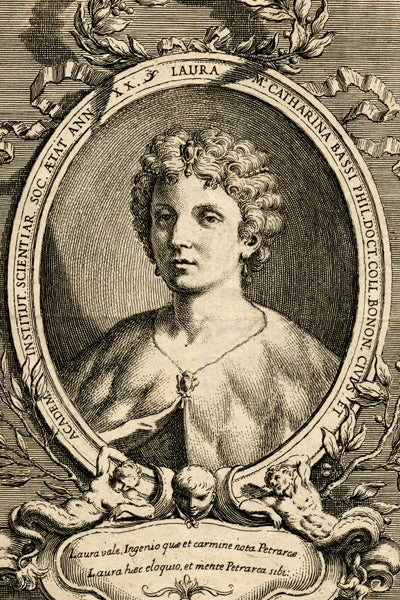|
January 4, 2012
Papers of Europe's first female professor to become available online, with help from Stanford's libraries
By Dan Stober

Laura Bassi (1711-1778) was the first woman to be offered an official teaching position at a European university. (Photo: Courtesy of Biblioteca comunale dell'Archiginnasio) Laura Bassi, a noted 18th-century Italian scientist and Europe's first female professor, left behind 6,000 pages of intriguing documents that describe her life and work. They now rest in the archives of the principal municipal library in Bologna, Italy, safe but not accessible to the world at large.
That is about to change. Stanford's libraries have teamed up with the Bologna library and the Istituto per i beni culturali della Regione Emilia-Romagna
to scan Bassi's archives and make them easily accessible online later this year.
"Bassi was widely admired as an excellent experimenter and one of the best teachers of Newtonian physics of her generation," said Paula Findlen, a Stanford history professor and a noted expert on Bassi.
"She inspired some of the most important male scientists of the next generation while also serving as a public example of a woman shaping the nature of knowledge in an era in which few women could imagine playing such a role."
Stanford will lend its technical chops to create an easily searchable website. The digitized documents, many of them handwritten, will be translated and explained.
Bassi experimented in her house, which she shared with her husband, Giuseppe Veratti, also a scientist, and their eight children. "Her home was known as a place for interesting and unusual things to happen," said Andrew Herkovic, the director of communications and development for Stanford's libraries.
The Biblioteca comunale dell'Archiginnasio, founded in 1801, is one of Italy's most important municipal libraries. Its rich print and manuscript collections reflect the special place that Bologna holds in the history of science, academia and culture.
"I always have great pleasure in seeing the collections of the Archiginnasio enhanced and made known to a wide public," said Pierangelo Bellettini, director of the Bologna Municipal Libraries.
The Istituto per i beni culturali della Regione Emilia-Romagna was established in 1974 to support and advise the regional government on cultural heritage policy and to act as an advisory body to local authorities.
Laura Bassi was born in 1711 and died in 1778. She was the second woman to receive a university degree in Europe and the first to be offered an official teaching position in any European university. She had a significant influence on the scientific culture of the Enlightenment in Italy. She was the most prominent female member of Italy's leading scientific society, the Bologna Academy of Sciences, and helped create a network of experimenters and teachers connecting Italy with France and England.
"As an erstwhile student of Italian archival material, I am very pleased that Stanford is working with the Archiginnasio to bring the Bassi material to a wider audience," said Stanford University Librarian Michael A. Keller.
-30-
|